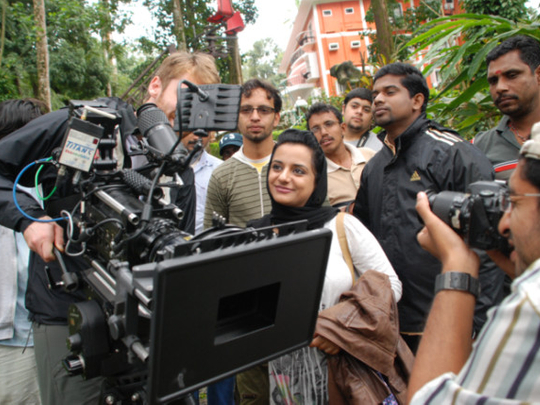
Meeting Nayla Al Khaja, the first Emirati woman to successfully establish a career in films, was like experiencing the calm grace of the desert along with the raw intensity of its latent potential. The hour and a half wait for Khaja proved worth it as the prolific film-maker is brutally honest about life and what she expects from herself.
“I am so angry at myself all the time. I think I have only achieved 15 per cent so far. I have a long way to go, I really do. I have to really shape up, I feel I’m a bit slow. I do take my time, but my dream is to make a beautiful feature film. If I accomplish that, that’s 50 per cent done.”
As producer, director and CEO of her production house, D-Seven Motion Pictures, Khaja is a pioneer in every sense of the word. Her repertoire of films is impressive for the controversial topics she has had the courage to tackle; from arranged marriages in Malal to child abuse in Arabana/Wheelbarrow and the outcome of a secret date between two locals in Once/Marra.
Along with the multiple awards she has received over the years, Khaja is also credited with starting the first film club in Dubai.
She graduated from Dubai Women’s College with a degree in Mass Communication in 1999 and went on to study film at Ryerson University in Toronto, Canada. She had the opportunity to dine with Paris Hilton in her LA kitchen and sit across Morgan Freeman in New York and discuss how it took him 20 years to break into the film line. Khaja also had the honour of receiving the 2005 Emirates Woman Award from late Pakistan prime minister Benazir Bhutto. “That was like wow! You know she said something that really touched me. She said ‘whatever happens never stop.’”
Despite the achievements, Khaja’s journey to success has not been easy. “Both my parents absolutely hate the fact that I am a film-maker. They don’t like it, they don’t discuss it with me. They are neutral about it, which is fine. Last night my father said ‘well think about it, you should stop making films’.”
The silver lining is her older brother, her mentor. She also draws a lot of courage from the appreciation she gets from her young fans. “Today I received an e-mail from a young Emirati girl that got tears in my eyes. It was so beautiful. It was like how I have impacted her and her career choice and how she looks up to me and that she will be very grateful if I call her for 10 minutes.”
An artist with a strong affinity for storytelling, Khaja grew up wanting to be a painter. She fell in love with the process of filmmaking, quite accidentally, at age 20, when she made a documentary film. Since then the silver screen has given Khaja the bandwidth to indulge both her passions. “If I look at my paintings they are like storyboards, each painting is a frozen moment in a movie.” Her ability to create a strong visual vocabulary on celluloid is evident in her black and white short film, Arabana, where each frame is like a painting.
Ask her how she would describe herself and she confidently utters two Latin words — “carpe diem (to seize the day)”. Khaja has big plans for her future. She plans to finish co-writing a feature length film this year and in the near future, she wishes to launch her own YouTube channel and start a film fund to produce at least three movies annually.
On the personal front, she is equally clear about her desires. “As a woman I know I want a child. Yes I’m divorced. There are potential people but nothing ever materialises. But I’m very hopeful. Even if I don’t biologically get a child, I’ve discussed adoption with my family.”
Khaja admits she is very sensitive but says it has helped her in becoming a film-maker. She also feels that she has a changed a lot since 2004 when she began making films. “I was extremely impulsive and impatient earlier. In terms of cinema, I can see my work has matured but there’s still a long way to go. And I’m falling even deeper in love with films. Sorry parents, I think now I know better what I want in life than I have ever known in the past.”
BOX
Khaja’s film clubs
In 2007, Nayla Al Khaja launched the UAE’s first official film club, The Scene Club, in Dubai. The club which began with just 85 members has over 7000 today and is fully subscribed every single month. Following up on the success, Khaja has launched Aflam Film Club in Abu Dhabi.
Membership to both the clubs is absolutely free.
To register and check out the latest films being screened, visit thecseneclub.com and aflamclub.com











